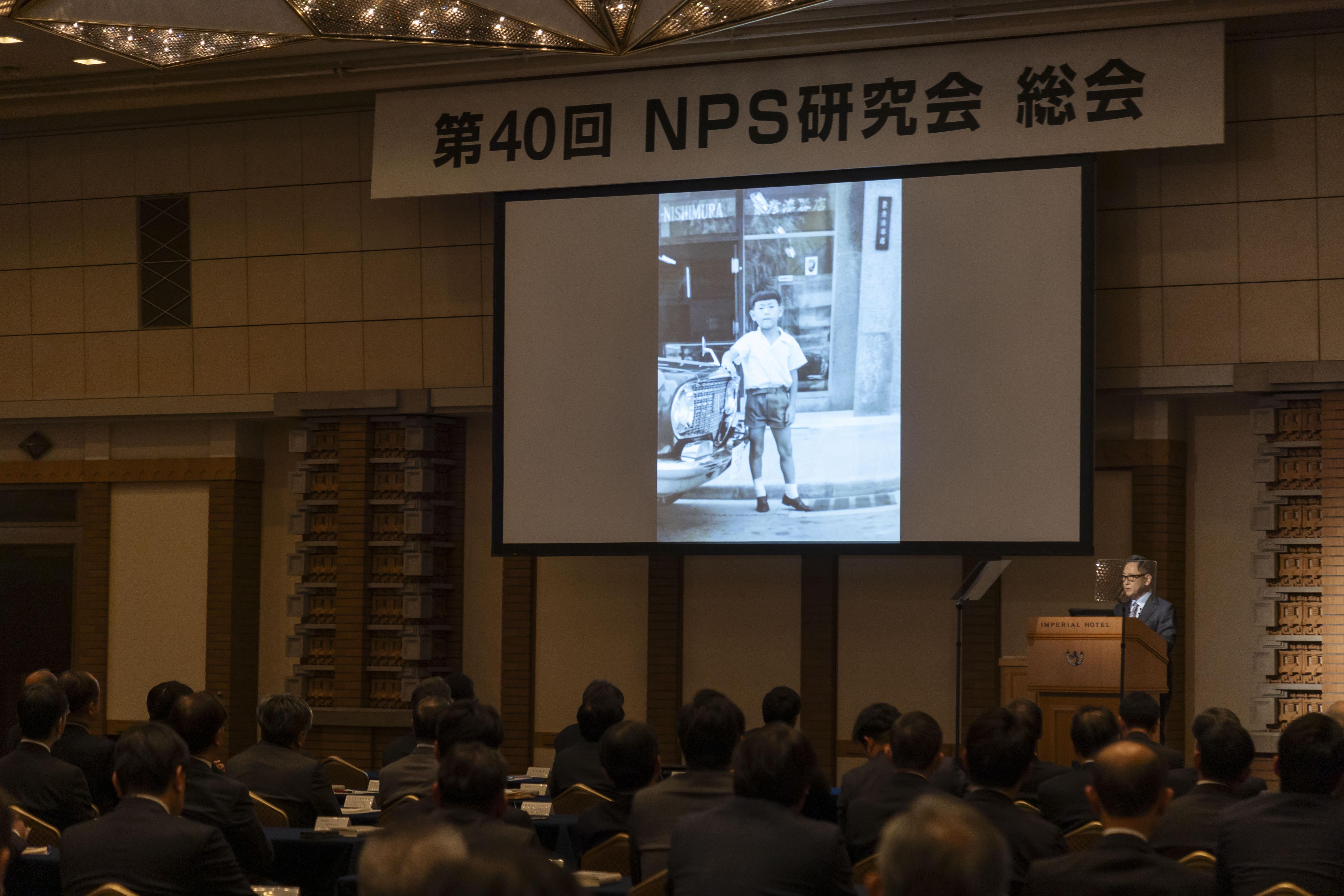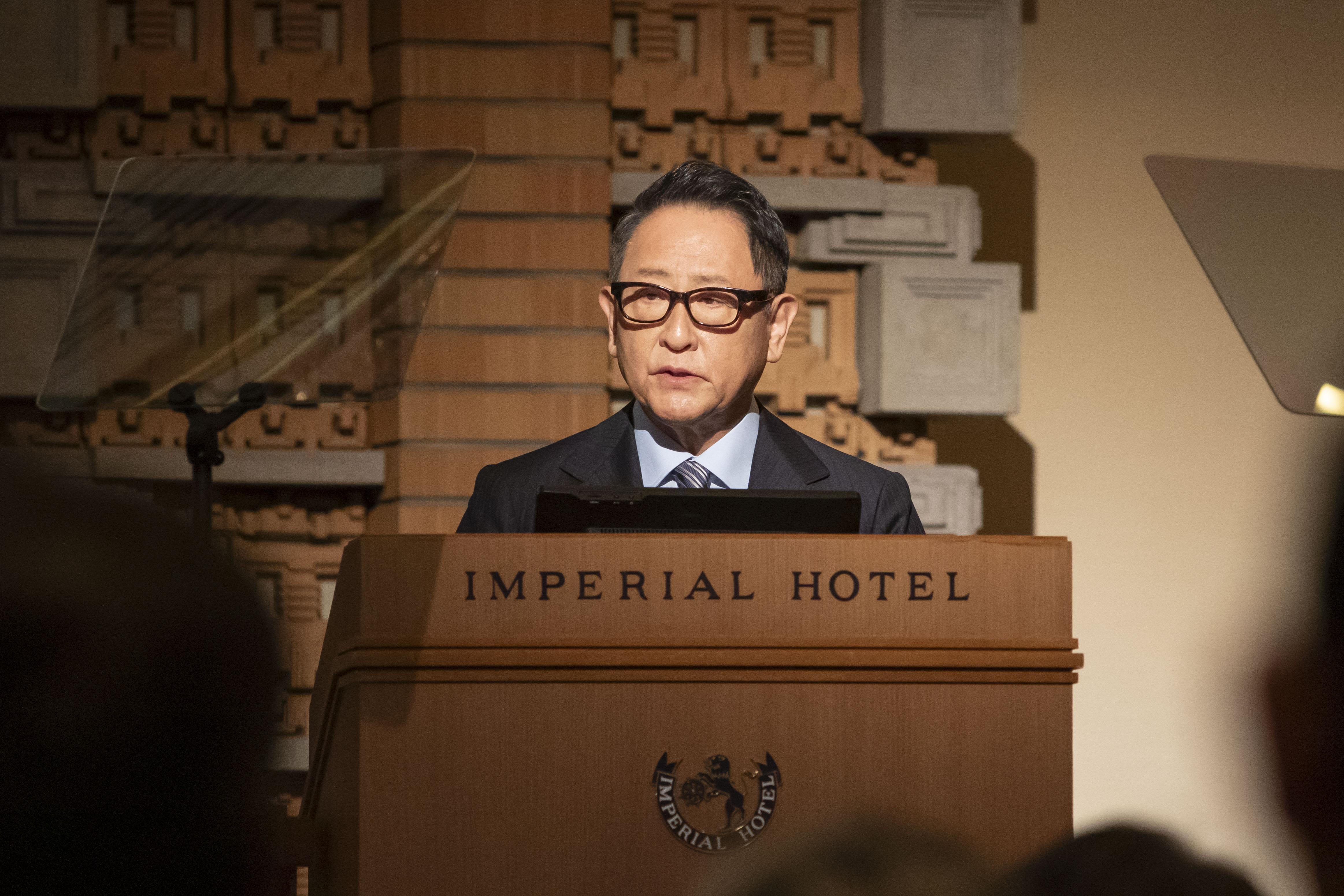
As a business leader, Akio Toyoda has approached countless decisions with a mindset rooted in the Toyota Production System. We share the lecture he delivered to a 200-strong audience of fellow corporate managers.

On January 13, Chairman Akio Toyoda presented a lecture to 200 corporate managers and executives in Tokyo, entitled “What TPS (Toyota Production System) Means to Me – The Fight to Restore Authority to the Genba.”

He was speaking at the general meeting of the NPS Management Institute*, an organization of manufacturing companies celebrating its milestone 40th year.
Unlike the numerous press conferences Akio has given in his career, opportunities for lectures have been few. Indeed, this was his first time speaking for 45 minutes on the particular topic of TPS.
Chairman Toyoda regards TPS not as a mere means of boosting plant productivity, but as his personal management philosophy. He shared the story of his journey, from first encountering TPS to the battles he fought after becoming president.
Here, we share the full lecture as a special part of the Toyota Times archive.
*NPS & the NPS Management Institute
Standing for the New Production System, NPS is a management approach centered on efficient manufacturing that adapts flexibly and rapidly to environmental changes.
The Management Institute was launched under Mikiya Kinoshita (Ushio Inc.), Kagetami Kawasaki (Oiles Corporation), and Masahito Hoashi (Kibun Foods Inc.) as an independent research group aiming to establish the New Production System.
Viewing TPS as a management philosophy that can be applied to sectors beyond automobiles, the institute currently has more than 45 member companies or one per industry.
In 1982, Taiichi Ohno, the former Toyota Motor Co., Ltd. Vice President who codified TPS, was appointed as the institute’s first chief advisor. Last year, Toyota Executive Fellow Shigeki Tomoyama became the fourth person to serve in the role.
Meeting with the NPS Management Institute

Hello everyone. I’m Akio Toyoda.
To begin, I would like to offer my prayers for those who lost their lives in the recent Noto Peninsula Earthquake and express my deepest sympathies to everyone affected by the disaster.
Together with the 5.5 million people in Japan’s auto industry, I will work to help people return to their daily lives and smiles as soon as possible.
My first encounter with the NPS Management Institute goes back more than 20 years to 1999.
The first time I attended a general meeting, I was brought along by Nanpachi Hayashi, who once served as one of the institute’s advisors. I still vividly remember being struck by Kikuo Suzumura’s ability to captivate the audience, as he carried on a lecture while hooked up to an IV drip.
I never thought I would be standing on this stage myself. That is honestly how I feel right now.
Today, I would like to share the story of my journey, from first encountering TPS to the battles I fought after becoming president.
Who am I ?
As an introduction, I would like to start by telling you a little bit about myself.
I was born in 1956 as the eldest son of the Toyoda family. At the time, my father, Shoichiro, was a director at Toyota.
My father brought home all sorts of cars, and they became a constant part of my daily life.
There is one memory from this period I will never forget.
It was May 3, 1966. The 3rd Japanese Grand Prix was held at Fuji Speedway. My father took me to the race as a present for my tenth birthday.
The gift was fast cars and noisy engines and watching all the cool adults involved with them.
That is what sparked my love of cars.
Looking back, perhaps my father’s greatest gift was creating the origins of “Morizo the car guy” within me.
Around this time, however, the shadow of Toyota became a persistent presence in my life, and I was branded a coddled kid from the founding family.
2. Deciding to join Toyota
After graduating from university, I worked at an American investment bank.
Besides wanting to learn how money flowed in the world and the latest financial technologies, I was also seeking my own life as an individual separate from Toyota. That’s how I came to choose this path.
Yet even there, I could not avoid people seeing me as “the Toyota prince.”
“Who am I?” The question grew ever larger inside me.
If there was no way to escape it, I would try engaging with Toyota head-on. In doing so, perhaps I would discover some clues as to who I truly was.
That was my mindset when I decided to join the Toyota Motor Corporation.
My father, who was then the company president, had only one thing to say: “No one at Toyota will want you working under them.” When I started working, I quickly found that he was absolutely right.
Anyone who got close to me would be seen as trying to curry favor with the president’s son. On the other hand, they couldn’t be too firm with me for fear that word would get around to my father.
From the perspective of people at Toyota, I must have seemed nothing but trouble.
Before I knew it, I had become someone that people would rather not get involved with—an untouchable.
3. Encountering the TPS
Despite all this, there was one place I found solace: the Motomachi Plant, where I was first assigned.
Getting to know the people of the Motomachi Final Assembly Division, the Machining Division, and other genba personnel, as well as the Toyota Production System, became a source of moral support.
Whenever I found the time, I visited the genba to search for ways to get involved.
One day, some genba personnel who saw me doing this built a bicycle for me to get around the site, pieced together from three broken bikes they had found.
I will never forget how delighted I was at that moment.
The people of the Motomachi Plant genba treated me not as a founding family member but as a human being, another new recruit.
Why is that? I believe it is because the TPS mentality had firmly taken root among genba personnel.
“Have you seen things for yourself?” “What are the facts?” As I continued to hope that people would see the real me, this TPS-driven perspective and life mentality was exactly what I was seeking.
Here, I would like to share a video.
At Nanpachi Hayashi’s recommendation, I moved to the Operations Management Development Division—the TPS headquarters—to undergo rigorous training as a TPS practitioner.
I believe that my deep-rooted TPS philosophy, skills, and conduct are what later enabled me to fulfill my role as the person responsible for Toyota.
As you know, TPS’s two pillars are the Just-in-Time concept and jidoka, or "automation with a human touch."
Just-in-Time means minimizing lead times, while jidoka is about ensuring genba operations are set up to stop when abnormalities are detected.
In fact, I believe that knowing when to stop is a skill required of the company leader in various business situations.
During my term as president, I made countless decisions. In Japanese, the word “decision” is written with characters meaning “resolve to cut loose.”
And indeed, many of the decisions I have made caused grief to others, including withdrawing from NUMMI—our joint venture with GM—pulling out of F1, ending production in Australia, and closing the Toyota Motor East Japan Higashi-Fuji Plant.
One thing that was true in every case is that I made my decisions while envisioning the impact on these workplaces and the people who would suffer, based on what I saw and heard in the genba with my own eyes and ears.
I believe that a key role of top leadership is deciding when it is time to quit. Anyone can make decisions that bring immediate recognition.
Only a leader who is prepared to bear responsibility can decide to abandon something for the sake of future generations.
The ability to understand and envision the genba allows one to take full responsibility; that is, to make a resolute decision.
“Have you seen things for yourself?” “Knowledge of the genba trumps all.” What I learned about TPS at the Motomachi Plant and Operations Management Development Division has since become my management philosophy.
Reaching that point, however, required overcoming significant roadblocks. The first that stood in my way was the wall between production and sales—namely, the old Toyota Motor and Toyota Motor Sales.

